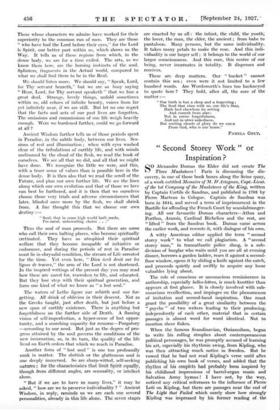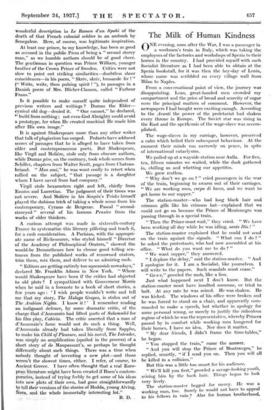" Second Storey Work " or Inspiration ?
SO Alexandre Dumas the Elder did not create The Three Musketeers ! Paris is discussing the dis- covery, in one of those book boxes along the Seine quay, of a work entitled Memoirs of M. D' Artagnan, Capt.-Lieut. of the let Company of the Musketeers of the King, written by Captain Cortils de Sandras, and published in 1701 by Pierre Marteau in Cologne. Captain de Sandras was born in 1644, and served a term of imprisonment in the Bastille for offending the French Court by scandalmonger- ing. All our favourite Dumas characters—Athos and Porthos, Aramis, Cardinal Richelieu and the rest, are " lifted " from the Sandras book. Dumas came across the earlier work, and rewrote it, with dialogue of his own.
A witty American editor applied the term " second storey work " to what we call plagiarism. A " second storey man," in transatlantic police slang, is a sub- division of burglar who waits until you are all at evening dinner, borrows a garden ladder, rears it against a second- floor window, opens it by sliding a knife against the catch; and proceeds quietly and swiftly to acquire any loose valuables lying about.
The role of conscious or unconscious reminiscence in authorship, especially belles-lettres, is much knottier than appears at first glance. It is closely involved with sub- conscious recollection, and impinges on the phenomenon of imitation and second-hand inspiration. One must grant the possibility of a great similarity between the " psyche " of two writers leading to their producing, independently of each other, material that in certain passages is almost word for word identical. Not to mention sheer flukes.
When the famous Scandinavian, Ossiannilson, began to write his rolling strophes about contemporaneous political personages, he was promptly accused of learning his art, especially his rhythmic swing, from Kipling, who was then attracting much notice in Sweden. But he vowed that he had not read Kipling's verse until after publishing his own book of verses, and added that the rhythm of his couplets had probably been inspired by his childhood impressions of barrel-organ music and Salvation Army hymns ! I have not, by the way, noticed any critical references to the influence of Pierre Loti on Kipling, but there are passages near the end of The Light that Failed which surely show how strongly Kipling was impressed by his former reading of the wonderful description in Le Roman d'un Spahi of the death of that French colonial soldier in an ambush by Senegalese. Here, of course, was legitimate inspiration. At least one prince, to my knowledge, has been as good as accused in the public Press of being a " second storey man," so we humble authors should be of good cheer. The gentleman in question was Prince William, younger brother of the Crown Prince of Sweden. Critics were not slow to point out striking similarities—doubtless sheer coincidences—in his poem, " Skriv, skriv, brusande liv ! " (" Write, write, thou pulsing spirit ! "), to passages in a Danish poem of Mrs. Blicher-Clausen, called " Farbror Frans."
Is it possible to make oneself quite independent of previous writers and writings ? Dumas the Elder— cynical old dog—denied it. " One cannot," he declared, build from nothing ; not even God Almighty could avoid a prototype, for when He created mankind He made him after His own image." It is against Shakespeare more than any other writer that talk of plagiarism has surged. Pedants have adduced scores of passages that he is alleged to have taken from older and contemporaneous.poets. But Shakespeare, like Virgil and Moliere, stole only from obscure authors, while Dumas pere, on the contrary, took whole scenes from Schiller, chapters from Walter Scott, pages from Chateau- briand. " Mon ami," he was wont coolly to retort when rallied on the subject, " that passage is a, daughter whom I have saved from bad company." Virgil stole hexameters right and left, chiefly from. Ennius and Lucretius. The judgment of their times was not severe. And Moliere in his Scapin,'s Tricks himself played the dubious trick of taking a whole scene from his contemporary, Cyrano de Bergerac. Pascal " second- storeyed " several of his famous Pensees from the works of older thinkers.
A curious attempt was made in sixteenth-century France to systematize this literary pilfering and teach it, for a cash consideration. A Parisian, with the appropri- ate name of Richesouree, who styled himself " Director of the Academy of Philosophical Orators," showed the would-be Demosthenes how to choose good telling sen- tences from the published works of renowned orators, trim them, mix, them, and deliver to an admiring mob. "Editors are getting entirely too squeamish nowadays," declared Mr. Franklin Adams in New York. " Where would Shakespeare have been if the critics had objected to old plots ? I sympathized with Gouverneur Morris when he said in a forenote to a book of short stories, a few years ago : I wish people wouldn't write and tell me that my story, The Malaga Grapes, is stolen out of The Arabian Nights. I know it ! ' I remember reading an indignant defence, by some dramatic critic, of the charge that d'Annunzio had lifted parts of Salammbo for his film. play, Cabiria. The critic asserted that a man of d'Annunzio's fame would not do such a thing. Well, d'Annunzio already had taken liberally from Sappho, to make his Child ofPkasure, and his novel, The Intruder, was simply an amplification (spoiled in the process) of a short story of de Maupassant's, so perhaps he thought differently about such things. There was a time when nobody thought of inventing a new plot—and those weren't the slowest times, either. I refer, of course, to Ancient Greece. I have often thought that a real Euro- pean literature might, have been created if Ibsen's contem- poraries, instead of trying feebly to get some of his ideas into new plots of .their own, had gone straightforwardly to tell their versions of the stories of Hedda, young Alving, Nora, and the whole immortally interesting lot." B. D.











































 Previous page
Previous page